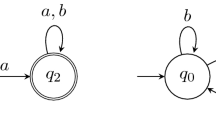Abstract
Residual languages are important and natural components of regular languages. Most approaches in grammatical inference rely on this notion. Classical algorithms such as RPNI try to identify prefixes of positive learning examples which give rise to identical residual languages. Here, we study inclusion relations between residual languages. We lead experiments which show that when regular languages are randomly drawn using non deterministicrepresen tations, the number of inclusion relations is very important. We introduced in previous articles a new class of automata which is defined using the notion of residual languages: residual finite state automata (RFSA). RFSA representations of regular languages may have far less states than DFA representations. We prove that RFSA are not polynomially characterizable. However, we design a new learning algorithm, DeLeTe2, based on the search of inclusion relations between residual languages, which produces a RFSA and have both good theoretical properties and good experimental performances.
This work was partially supported by the “projet TIC du CPER TACT - région Nord - Pas de Calais”
Preview
Unable to display preview. Download preview PDF.
Similar content being viewed by others
References
Janusz A. Brzozowski. Derivatives of regular expressions. Journal of the ACM, 11:481–494, 1964.
F. Coste and D. Fredouille. Efficient ambiguity detection in c-nfa. In Grammatical Inference: Algorithms and Applications, volume 1891 of Lecture Notes in Artificial Intelligence. Springer Verlag, 2000.
Thomas G. Dietterich. Approximate statistical tests for comparing supervised classification learning algorithms. Neural Computation, 10(7):1895–1923, 1998.
F. Denis, A. Lemay, and A. Terlutte. Learning regular languages using non deterministicfinite automata. In ICGI’2000, volume 1891 of Lecture Notes in Artificial Intelligence, pages 39–50. Springer Verlag, 2000.
F. Denis, A. Lemay, and A. Terlutte. Residual finite state automata. In 18th Annual Symposium on Theoretical Aspects of Computer Science, volume 2010 of Lecture Notes in Computer Science, pages 144–157, 2001.
E. M. Gold. Complexity of automaton identification from given data. Inform. Control, 37:302–320, 1978.
Colin De La Higuera. Characteristic sets for polynomial grammatical inference. Machine Learning, 27:125–137, 1997.
J. E. Hopcroft and J. D. Ullman. Introduction to Automata Theory, Languages, and Computation. Addison-Wesley, 1979.
K. J. Lang, B. A. Pearlmutter, and R. A. Price. Results of the Abbadingo one DFA learning competition and a new evidence-driven state merging algorithm. In Proc. ICGI’98, volume 1433 of Lecture Notes in Artificial Intelligence, pages 1–12. Springer-Verlag, 1998.
J. Oncina and P. Garcia. Inferring regular languages in polynomial update time. In Pattern Recognition and Image Analysis, pages 49–61, 1992.
Sheng Yu. Handbook of Formal Languages, Regular Languages, volume 1, chapter 2, pages 41–110. Springer Verlag, 1997.
Author information
Authors and Affiliations
Editor information
Editors and Affiliations
Rights and permissions
Copyright information
© 2001 Springer-Verlag Berlin Heidelberg
About this paper
Cite this paper
Denis, F., Lemay, A., Terlutte, A. (2001). Learning Regular Languages Using RFSA. In: Abe, N., Khardon, R., Zeugmann, T. (eds) Algorithmic Learning Theory. ALT 2001. Lecture Notes in Computer Science(), vol 2225. Springer, Berlin, Heidelberg. https://doi.org/10.1007/3-540-45583-3_26
Download citation
DOI: https://doi.org/10.1007/3-540-45583-3_26
Published:
Publisher Name: Springer, Berlin, Heidelberg
Print ISBN: 978-3-540-42875-6
Online ISBN: 978-3-540-45583-7
eBook Packages: Springer Book Archive




